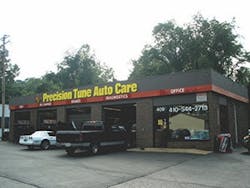It is a big deal for any franchisor to take the business internationally, and in the auto service industry that has often meant opening shops in Canada and Mexico. Precision Tune Auto Care (PTAC), which began franchising domestically in 1977, has not only brought its business south of the border to Mexico, but also to locations throughout the world.
In 1990, the company began to offer franchises internationally, and today, PTAC has operations in more than 20 states and in Mexico. It also has shops in Portugal, Republic of Georgia, Taiwan, Oman and Nigeria. Worldwide, there are 330 independently owned and operated auto service centers under the Precision Tune Auto Care brand that provide routine automotive maintenance and repair.
Bill Childs’ Brainchild
In 1976, Bill Childs acted on his idea to create a convenient automotive “tune-up” business, which he opened in Beaumont, Texas, and named Precision Tune. While Childs likely didn’t consider a worldwide expansion, he did see the potential to offer franchises for his business.
Just a year after launching the business, Childs offered the first franchise to Wally and Dolly Metrojean, who opened up shop in Alexandria, Louisiana. Over the next four decades, the business grew and expanded; Precision Tune acquired other brands along the way, notably the national 60-Minute Tune, which quickly added 60 franchises on the West Coast.
In addition to geographic expansion, Precision Tune, which officially adopted the Precision Tune Auto Care moniker in 1996 to address the industry shift from specialization to complete auto care, also expanded the services it offered to its customers.
“We started doing tune-ups,” explained Robert Falconi, the company’s president and CEO. “At the time, there were specialty businesses offering brakes and mufflers, and we saw that opportunity to offer full service; everything from oil changes to selling tires, and we are even exploring the glass business at some locations.”
This change was necessitated by customer needs, but it presented some challenges along the way, as well.
“We are a one-stop shop because customers today don’t want to take their car to a dozen different places for individual services,” Falconi said. “You want to go to one place and get everything taken care of these days.”
At the same time PTAC has ensured it has kept pace with today’s more advanced vehicles, and much of that Falconi credits to having the right person.
“Cars are very different today than they were 40 years ago, and we saw the need to keep up with the advances over the years,” Falconi explained. “We have an R&D department headed up by Joel Burrows, whom we like to describe as the ‘car doctor.’”
“Dr. Burrows” visits not only the different PTAC locations to help them keep up to speed, but over the past 27 years he’s also done the testing on new equipment and helped develop and lead the R&D group so it can be in step with whatever rolls into the shops.
“There are new resources that can help our folks better diagnose the problems a vehicle might have,” Falconi added. “There are two learning challenges we’ve faced as a business: we offer more services while today’s cars are more complicated, but in the U.S. and abroad we know we’re up to the challenge.
In Tune With the World
As much as keeping pace with the changing vehicle has been a challenge, so too was bringing the business around the world, but as a result PTAC has been able to go where few auto service companies have gone. It started in 1990 in Taiwan and has only continued from there. The goal has always been to help the customer — near and far — by offering convenience and quality service where it might not otherwise be.
“What I learned in dealing with our franchises in other countries is that too often the consumers have two options, neither of which is ideal,” Falconi explained. “The first is to go to the dealerships, which can be far away and are too expensive or too slow. The flip side is to go to a roadside mechanic, and literally, it is a mechanic on the side of the road, which can be very unreliable. In some parts of the world, there is really no other option to get a vehicle fixed — whether it is a simple tune up or major repair.”
This left drivers with the option to not spend a lot but drive away uncertain if the repairs were the right ones or take the car and wait a long time with the dealer. PTAC was just the right company, at the right time, to fill a very specific and needed niche.
“There really isn’t anyone else doing what we are doing, so we think we’ve filled a real need, and we’re happy to provide a service that wasn’t there,” Falconi said.
Expansion to markets as diverse as Nigeria, Oman, Republic of Georgia and Taiwan has presented other challenges beyond the complexity of vehicles. Staffing, communication and language issues all needed to be overcome, and PTAC has ensured that the businesses run smoothly — even as some of the regions have faced various turmoil from natural disasters to outright conflicts.
“Here in the United States the problem with any franchise business is one of time differences, but this becomes much greater on the global scale,” Falconi said. “Communication can be even more challenging as it makes it difficult to arrange times to talk to the franchises. Distance is another issue.”
Given the turmoil in Nigeria, which has been in the news in the last couple of years as the terrorist group Boko Haram has been waging an open war in the northeastern part of the country, it might seem that most company presidents would opt to stay away. However, Falconi has visited the country to check in on franchises but admitted there were times where it was a little more unnerving than visiting a shop in America.
“You are certainly aware of where you are, and it isn’t like going to San Francisco, I’ll say that,” Falconi admitted. “You are aware even when you don’t run into serious problems.”
Fortunately for Falconi, he’s avoided anything resembling an action film, but did tell NOLN there was a time when his group was notified that they needed to change hotels. The U.S. State Department issued a warning about terrorist activity, and while nothing happened, it made him take notice of his surroundings during that trip.
“Things like that don’t usually happen in places like Portugal or, of course, the United States,” he added. “It makes it challenging at times, but we try to meet the demands.”
Cultural Differences
The other challenges of operating a franchise in these foreign lands are ones of cultural differences, and this can involve finding the right talent.
“The culture can make things happen at a slower pace,” Falconi said. “In the U.S., we try to move to resolve issues when we feel we might need to make a change with a manager. In countries like Portugal, it doesn’t work that way and certainly not so quickly.”
The other problem is that countries like Nigeria and Oman don’t exactly have “car cultures” where kids grow up with serious interests in cars and automotive repair. This resulted in difficulty for the franchises in finding the right people to staff the shops.
“There isn’t as much training in automotive service in those countries, so that is a challenge,” Falconi said. “In Nigeria, they don’t have a lot of trained staff, but we do our best to provide the training. Our franchisor in Nigeria even set up a dormitory for the staff to live in, as many people need to travel great distances for work.”
While it might not sound ideal to live in a dorm and work at a shop, this is actually a good way to help the employees who might not otherwise obtain these skills. Given the lack of infrastructure in mass transit even a 20-mile distance to work can become a serious obstacle. PTAC’s operations in Nigeria are a way for employees to obtain a skill in a good paying job.
“Our franchisor has really made an effort where there are very wealthy and very poor, so this helps provide an opportunity and grow Nigeria’s middle class,” Falconi noted. “In Nigeria, it is a huge challenge to develop that middle class, and we’re just a tiny part of it.”
Beyond Nigeria, Asia and the Middle East, PTAC sees the next expansion to be in Central or South America, and Falconi explained that the U.S. Commerce Department and the State of Virginia, where the company is headquartered, have been helpful.
“They’ve each provided resources to help us find potential partners,” Falconi said.
Helping America’s Veterans
Back in the United States, PTAC has also ensured it is helping those who have served their country. The company has been named a Military Friendly Franchise by GI Jobs and continues to support veterans.
“My father served 30 years in the army,” said Falconi, who grew up as an “army brat,” and he added that supporting veterans remains a huge goal for him personally. The company has been a supporter of the Rolling Thunder Charities organization that supports veterans and active military and their families.
PTAC was also named a Top 50 Franchise for Veterans and a Top 50 Franchise for Minorities by USA Today. Giving back while serving the customer is part of its core values.
“We try to be a patriotic company,” Falconi added. “It is important to me personally.”
About the Author

Peter Suciu
Peter Suciu is Michigan-based writer and NOLN freelance contributor who has contributed to more than four dozen magazines, newspapers and websites. He lives in the land of cars not far from one of Henry Ford's estates.
